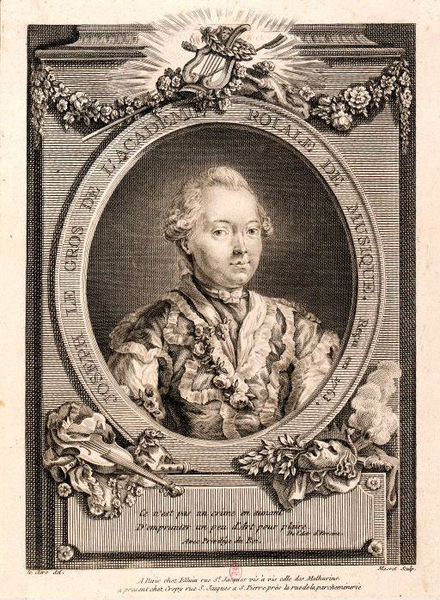<Back to Index>
- Economist Hermann Heinrich Gossen, 1810
- Singer and Composer Joseph Legros, 1739
- Prime Minister of the United Kingdom Henry Campbell Bannerman, 1836
PAGE SPONSOR

Joseph Legros (7 September or 8 September 1739 – 20 December 1793) was a French singer and composer of the 18th century. He is best remembered for his association with the composer Christoph Willibald Gluck. Legros sang the role of Orpheus at the premiere of the 1774 version of Gluck's opera Orfeo ed Euridice and is usually regarded as the most prominent haute - contres of his generation, though his acting is reputed to have been mediocre.
Legros was born at Monampteuil, Laon. After initial training as a choirboy, when his voice broke Legros developed the voice of a haute - contre, a type of French high tenor that was typically used for the heroic male lead in French operas of the period. Legros made his début at the Paris Opéra in 1764 and became the leading haute - contre at the Opéra, a status he held until his retirement in 1783, caused in part by his increasing obesity.
Legros began his operatic career singing the principal roles in the tragédies lyriques of Jean-Philippe Rameau. Later, he adapted to the new Italianate style and sang many of the main roles in Gluck's French operas, including Achilles in Iphigénie en Aulide, Admetus in the 1776 revision of Alceste, and Renaud in Armide. In 1774 Gluck adapted the role of Orpheus in Orfeo ed Euridice, a part originally sung by the castrato Gaetano Guadagni, for Legros to sing. In this revision, set to a French libretto and retitled Orphée et Eurydice, Gluck extended the range of the part of Orpheus to the higher E flat of the treble stave: the part demands a particularly high tessitura and a large range. He also created roles in three operas by Niccolò Piccinni, including the role of Pylades in the composer's Iphigénie en Tauride. His final role was the title role in Antonio Sacchini's Renaud.
From 1777 Legros directed the Concert Spirituel, where he promoted performances of the music of Haydn and Mozart. He collaborated with L.-B. Desormery to rewrite the second act of François Lupien Grenet's opéra - ballet Le triomphe de l'harmonie. Their work was performed at the Opéra in 1775 under the title Hylas et Eglé. During this time he also composed an unperformed opera, Anacréon, and some songs. He died at La Rochelle.